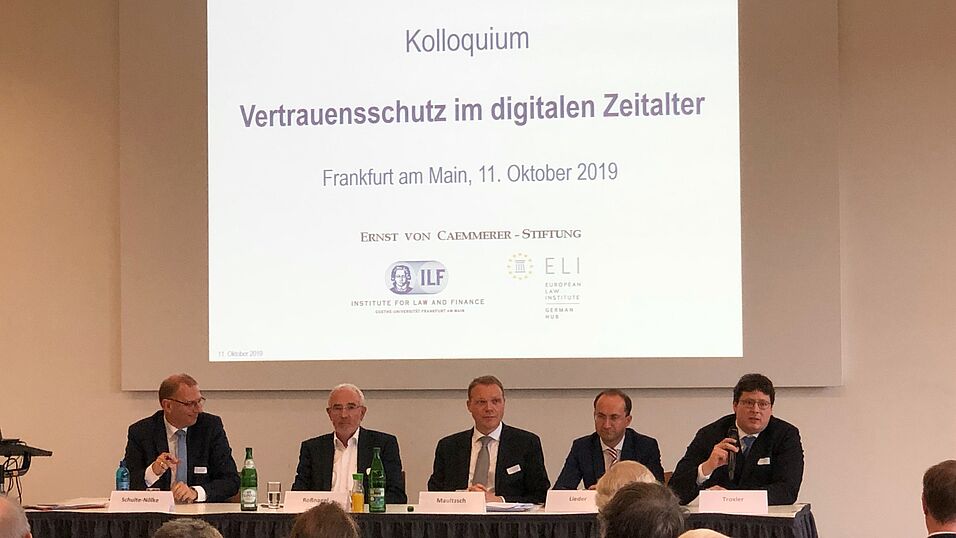In his introductory remarks, Uwe Blaurock (Freiburg University) pointed to the fact that the protection of trust plays an important and multidimensional role in digitalised markets. He introduced the main topic of the conference, namely the potential but also the limits of law as a facilitator of trust in modern legal relations. Several speakers shed light on specific aspects of this main topic. Alexander Roßnagel (Kassel University) discussed the reliability of digitalised juridical acts. He presented the efforts, which have been made on a European and national level to secure the integrity and authenticity of digital acts. He argued for seeing a workable digital infrastructure as a public good rather than a market good. This account could enhance the availability and practicability of digital juridical acts from a user’s perspective.
Gerald Spindler (Göttingen University) reported on blockchain transactions. He started from the assumption that the very purpose of blockchain technology is to reduce risks and uncertainty and, thereby, to make specific ‘legal’ protection superfluous. However, he showed that this promise needs to be treated with some caution by using examples like the famous decentralised autonomous organization (DAO) case. Spindler concluded that the current state of the law, on the level of conflict of laws as well as substantive law, is still insufficient to warrant adequate legal protection of legitimate expectations.
Tizian Troxler (Basel University) gave a comparative overview on the regulation of crowdfunding in the US, the UK, and Switzerland. He showed that the protection of trust and a workable legal infrastructure for crowdfunding transactions have to be secured, first of all, by the means of regulatory law. However, the comparative overview showed that the law is still in a state of flux in that respect and that some of the regulators’ accounts lack deeper consistency.
Jan Lieder (Freiburg University) discussed the digitalisation of company law with a focus on the EU Company Law Package (online incorporation, register publicity) and the rules on virtual shareholders’ meetings. He showed that all aspects of the digitalisation of company law pose specific problems for the protection of trust. For instance, he argued in favour of upholding the German account of involving public notaries in the process of incorporation as a valuable means of ‘preventive administration of justice’.
Finally, former member of the ELI Executive Committee, Hans Schulte-Nölke (Osnabrück University/Radboud University Nijmegen) reported on the ELI Model Rules on Online Platforms. He gave insights into the working model of the ELI Team and those parts of the Draft Model Rules that are particularly relevant for the protection of trust. In the latter respect, he identified the regulation of rankings, reputational systems, and the issue of liability of the platform operator as the most pertinent fields. Schulte-Nölke showed that the idea of a co-regulation between the lawmaker and private bodies may produce sound results with respect to the quality of reputational systems. He also elucidated that the problem of platform operators’ liability had been vividly discussed by the ELI Team between the accounts of, on the one hand, a protection of legitimate expectations and, on the other hand, a liability for predominant economic influence.
The organisers would like to thank all the speakers and the participants for the discussions which provided fruitful insights. A final version of the conference proceedings will be published in the series of the Ernst von Caemmerer Foundation.

